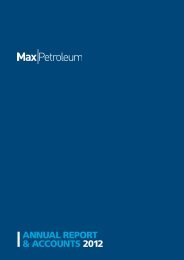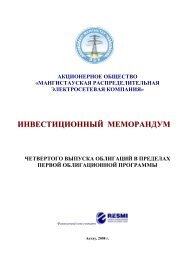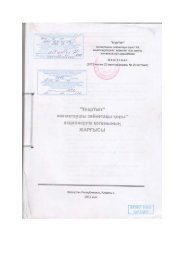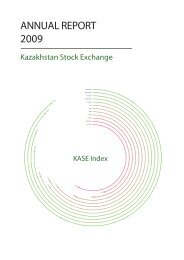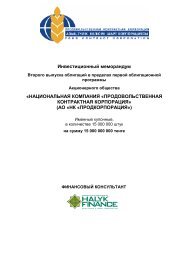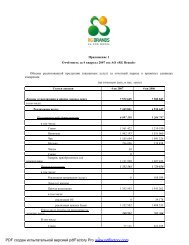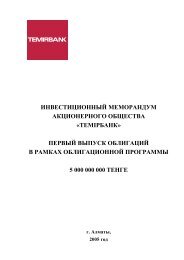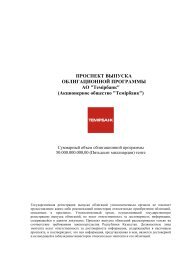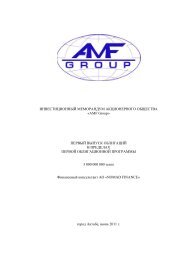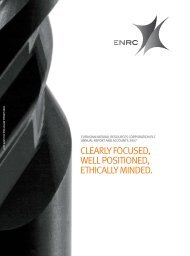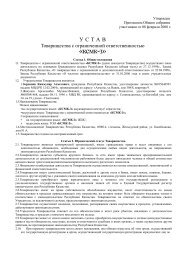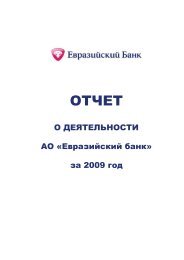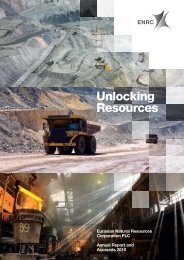JPMorgan - KASE
JPMorgan - KASE
JPMorgan - KASE
Create successful ePaper yourself
Turn your PDF publications into a flip-book with our unique Google optimized e-Paper software.
end of 1998, the Kazakhstani government changed its internal environmental regulatory<br />
structure by eliminating and combining certain ministries. We believe that, as a result of these<br />
changes, the environmental laws and regulations in Kazakhstan will become increasingly<br />
protective of the environment. Also, as new environmental laws and legislation are enacted and<br />
the old laws are repealed, interpretation, application and enforcement of the laws may become<br />
inconsistent. Compliance with existing or more stringent laws or regulations or more vigorous<br />
enforcement policies of any regulatory agency could in the future require material expenditures<br />
by us for the installation and operations of systems and equipment for remedial measures, any or<br />
all of which could have a material adverse effect on us. We cannot assure you that we will not, or<br />
will not be required to, incur substantial or material financial obligations in connection with<br />
environmental compliance.<br />
Oil and Gas Operations<br />
Our oil and gas operations in Kazakhstan are subject to periodic inspection by government<br />
environmental protection agencies. These inspections have resulted, from time to time, in the<br />
receipt of formal communications from these authorities detailing our non-compliance with<br />
specified environmental regulations and requiring corrective actions on our part. In many cases,<br />
these communications advise that, in the event that we do not take appropriate remedial action<br />
within a required period of time, we will be subject to a number of penalties including fines and<br />
the closing of various of our facilities. We take all reasonable steps to work with these regulatory<br />
authorities and to correct any non-compliance matters raised by these communications. However,<br />
from time to time we have not been able to take appropriate action within the time periods<br />
required by the regulatory authorities. To date, the applicable regulatory authorities have not<br />
taken any material action against us with respect to such matters. We cannot provide any<br />
assurances that material action will not be taken against us with respect to these issues or that<br />
we will not be required to incur substantially more expenses than we currently expect in<br />
connection with our environmental action plans.<br />
We incur recurring costs associated with managing pollution in our ongoing operations. We pay<br />
environmental user fees based on the volume of pollutants we generate, including the pollutants<br />
cited as violations by the Qyzlorda Environmental Department. In general, environmental user<br />
fees are not material for emissions for which we possess emissions permits. We believe that, in<br />
the long-term, with the installation of the Kumkol electrical power plant utilizing the majority of<br />
our associated gas, and as improvements are made in our waste management and pollution<br />
prevention practices, the volume of pollutants we generate will decrease. However, the amount<br />
of environmental user fees may not significantly decrease because reductions in volumes of<br />
pollutants that are generated may be offset by yearly increases in legislated environmental user<br />
fees. All material environmental permits required for our oil and gas production operations in<br />
Kazakhstan are currently in place. We also pay fines for discharge of wastes for which we do not<br />
have permits. Failure to show progress in any of the items in our environmental action plans<br />
could result in the cancellation or non-renewal of any environmental user permits that we<br />
currently hold or the increase in fines we incur for pollution of the environment of up to 15 times<br />
the amounts of the normal environmental user fees. The usual practice of Kazakhstani<br />
environmental authorities in response to violations of applicable environmental protection laws<br />
and regulations appears to be the imposition of increasing fines and penalties. Our licenses and<br />
hydrocarbon contracts, however, provide that significant and continuing breaches of the terms of<br />
the same, which include the requirement for compliance with applicable environmental<br />
protection laws, could result in the suspension or termination of our licenses and hydrocarbon<br />
contracts.<br />
In accordance with Kazakhstani legislation, produced gas must either be used to produce energy<br />
or be re-injected. We are currently flaring approximately 96% of the gas produced from our<br />
fields. In September 2000, HKM entered into an agreement with the Qyzylorda Oblast,<br />
Kazgermunai, a number of Kazakhstan government ministries and a number of other parties<br />
whereunder the parties agreed to cooperate with respect to determining an appropriate gas<br />
utilization program. In early 2001, we concluded discussions with Kazakhstan government<br />
authorities to arrive at a solution for the utilization of associated gas pursuant to this agreement.<br />
82



